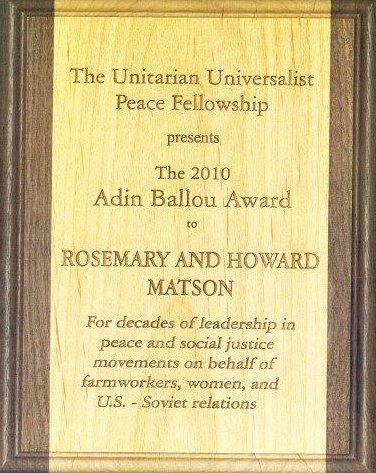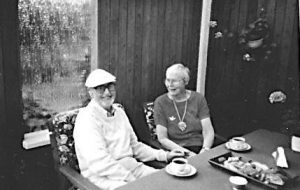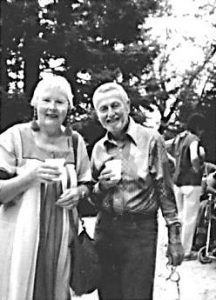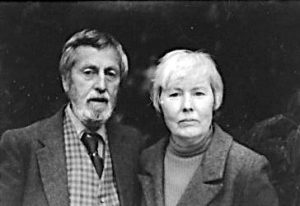
Important leaders in the Unitarian Universalist Movements over decades, Rosemary and Howard both championed Social Justice and Women’s Rights causes. The Women and Religion Movement which considered the impact of religion on the status, freedom, and respect for women was a particular focus for both Rosemary and Howard.
During their lives they received many awards from Unitarian Universalist groups, the Association and community groups that worked for Peace, Justice and equal rights for all. Both Howard and Rosemary received the life-time award above from the Adin Ballou Peace Fellowship (see plaque above). Rosemary traveled to G.A. at the age of 93 to receive the award.
They led many delegations to the Soviet Union as well as bringing Soviet delegates here to the U.S. during those most difficult years of the arms race. They were present at the demonstrations at the Kazakhstan nuclear testing grounds – along with many Soviet citizens – that helped to close that site. The contacts that Rosemary and Howard established in Russia were essential for the mission that Rev. Paul Sawyer and his wife Susan carried out in 1992 and 1994 to found UU Fellowships in Moscow and St. Petersburg.
Rosemary Matson
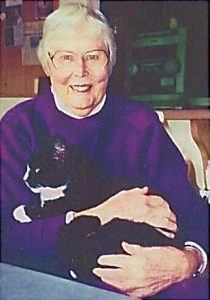
Rosemary Matson Memory Book
Rosemary became a Unitarian Universalist lay leader and then a Development Professional in the 1950s and 1960s. She continued after leaving Starr King School for the Ministry to provide leadership in the Women & Religion and also international citizen diplomacy. (Rosemary Matson Memory Book details her many involvements.)
A major participant in the Women and Religion Movement, Rosemary Matson was a colleague and friend of Lucile Longview since the passage of the W&R Resolution (click her to learn more bout Lucile). Rosemary served as co-chair of the continental W&R Committee appointed by the UUA President Paul Carnes for its three years of existence from 1977-1980. She continued her activism and advocacy for Women and Religion until she passed at the age of 97 on September 17, 2014.
Two Important UU Awards
Among her many awards, Rosemary received two that were particularly meaning to her because they honored her Unitarian Universalist participation and its impact on the larger society.
Ministry to Women Award
The Ministry to Women Award was awarded by the Unitarian Universalist Women’s Federation in 1998 to both she and Lucile Longview.
In 2010, she received the following honorary doctorate:
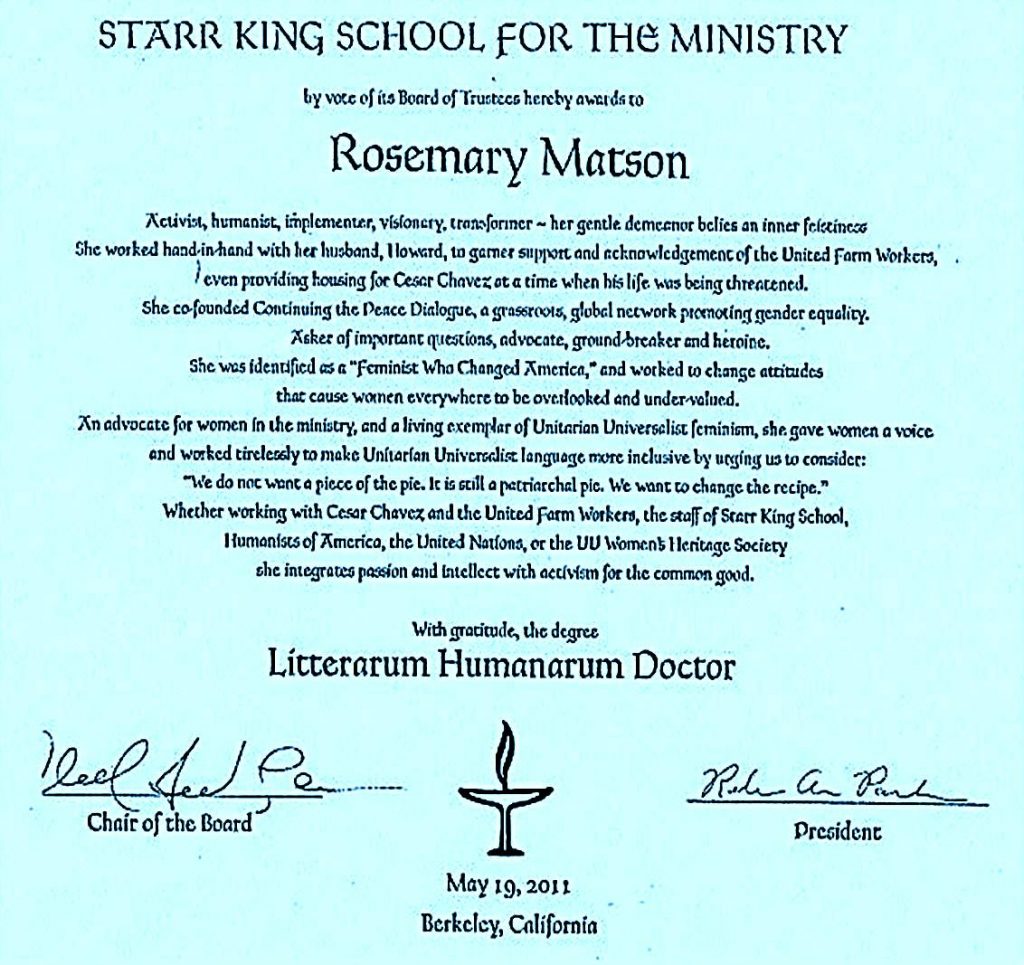 Liz and Bob Fisher prepared this booklet which was distributed widely at the graduation and to others. It also celebrates Rosemary’s many activities, actions and antics.
Liz and Bob Fisher prepared this booklet which was distributed widely at the graduation and to others. It also celebrates Rosemary’s many activities, actions and antics.
Woman Without Fear: Highlights of Rosemary Matson’s Life
Howard Matson
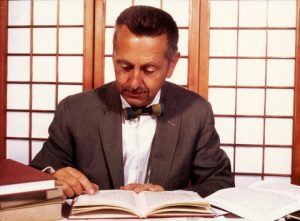
Howard became a Unitarian Universalist minister in 1932. He served several churches including those in Santa Monica and San Francisco. Howard retired from parish ministry in San Francisco in 1961. From 1971-78 he was the minister for Migrant Farm Workers for the UUA. He wrote a book of very clever and moving essays entitled The Fourth Wise Man.
Howard Matson was a strong feminist and a supporter of the Women and Religion movement from its inception. In conversations and in print he related poignant examples of what it means for the world to deal with sexism throughout history.
Attached is an excerpt of his article:
A Historic Distortion: Some thought on childhood, feminism, and the great universal awakening that can heal our tortured planet which appeared in The Humanist, July/August 1990.
In this piece he points out how the history we have been taught has often left the facts about women. He comments: “The historic depth of this distortion is the reason why so many women—as well as men—do not know that they are being oppressed or marginalized or trivialized.” Howard outlines his early attitudes when he did not even notice the institutional sexism at Harvard in 1929-32 where he attended theological school. He reviews international examples where progress is being made to reverse gender based discrimination and much more.
Howard’s Article on Feminism in The Humanist Magazine
THE FOURTH WISE MAN
“A few years before his death–when times were less hectic for us–Howard and I began to work on a task very important to both of us. He wanted to republish his first book The Fourth Wise Man, editing out the sexist language that permeated its pages. It had been written more than fifty years ago, before the feminist movement taught us the importance of inclusive language. I was eager to do this because it is a fine book full of poetic wisdom and humor and it should be shared. The contents are as relevant to today’s troubled world as it was when it was first published in 1954.” ~from introductory remarks by Rosemary Matson
Liz and Bob Fisher managed to format and publish the book so it could be released in 2010, at General Assembly, when Rosemary (in person) and Howard (posthumously) received the Adin Ballou award.
The entire book can be accessed and downloaded here:
The Fourth Wise Man
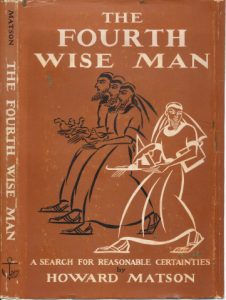 Introduction and Art for Howard’s Book
Introduction and Art for Howard’s Book
A QUOTE FROM THE FOURTH WISE MAN, BY HOWARD MATSON, ORIGINALLY PUBLISHED 1954
RE-ISSUED WITHOUT SEXIST LANGUAGE, 2010
Yes, the winds of life are broad and deep. At any moment of our life journey we may choose to face them. In this way we will find strength and exhilaration. At every moment of our life journey we may also note the direction in which the winds generally blow. Out of this knowledge we may chart our course. We need not be disturbed if going with the tide and facing the wind seems to confront us with contradiction. Knowing and doing both is living.
VOICES FOR CHANGE
Interviews with Monterey County Activists and Organizers, 1934-2015 from the People’s Oral History Project.
I
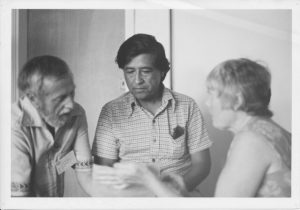

Voices of Change flier
This incredible project includes interviews with dozens of activists over the last forty years in Monterey County, California. This unique area, just 2 hours south of San Francisco was the place where many national and international social justices issues were confronted. Depressed wages and unsuitable working conditions were confronted by the United Farmworkers; environmental degradation and education is engaged by the Monterey Aquarium, one of the finest in the world. Women’s participation in public life is celebrated and encouraged. Even though Rosemary and Howard had both died before this book was compiled and published, their words are included.
Liz Fisher’s introduction to quotes from Rosemary and Howard included in Voices of Change:
Rosemary Matson died on September 27, 2014. She had an initial interviewed by Karen and Gary just two months before she passed. There was not time to complete the interview before she passed. Being a colleague and longtime friend of Rosemary and Howard Matson (who died on August 17, 1993), I was able to fill in the details included here. I knew the Matson’s since 1982 and participated with Rosemary in many activities related to Women and Religion within the Unitarian Universalist Denomination.
Rosemary kept copies of publications she and Howard authored, and meticulous files chronicling their activist activities as well as those of their interesting colleagues and friends. Over the last eight years of her life, we reviewed together her extensive files on social change activities, articles about them individually and as a couple, and Howard’s sermons and manuscripts, both published and unpublished. During these years, my husband Bob Fisher and I produced several publications about the Matson’s activities based on these materials and our conversations.
Two years before she died, Rosemary entrusted important personal documents and files to me with the understanding that I would continue to further share this material with others who would benefit from knowing about she and Howard’s lives and activities. She believed that sharing the details of her and Howard’s activism, as well as that of others, helped people to understand the inequities of varied social situations and often inspired them to act on behalf of peace and justice issues. I agree. As you can tell, she loved this project and was proud that she and Howard are included. Can’t you see them both smiling?
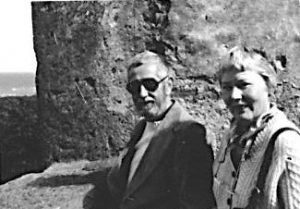
Rosemary Matson in her own words:
In 1962, Howard received a call to become a minister in the Unitarian Church in San Francisco where one of his responsibilities was to provide leadership on social justice concerns. I began working for the Starr King School for the Ministry raising funds. I also worked for the Pacific Central District as the first woman ministerial settlement representative in the UUA. Thus began a very active and productive time for both Howard and me. It was the 1960s, remember.
In my 50s I hit my stride, channeling my energies and skills into working for women’s rights, women’s values, herstory, and looking at the influence that religion had on the status of women. In my 60s I discovered feminism and struggled to understand the difference between women’s rights and feminism.
In 1963 Betty Friedan’s book The Feminine Mystique was published. That book changed many lives, ours included. I joined the National Organization for Women (NOW) and subscribed to the new MS magazine. Women’s rights and women’s issues took over my life.
When I worked at Starr King school the students were all-male and the faculty was all-male. The curriculum was male–centered. My consciousness began to change in the early 70s as I worked for changes at the school. In 1971, four women applied to Starr King and were admitted. Prior to that date, there had only been two women in the school in the 1960s.
As part of my placement duties, I began to advocate to congregations that they consider women candidates. I also began revising the school’s promotional materials to be more gender inclusive. I demanded, along with several Board members, their own first names be used in the school catalog (i.e. Rosemary Matson, rather than Mrs. Howard Matson) causing quite a controversy. I also helped raise funds to endow a faculty position to be filled by a woman, another first.
Howard Matson in his own words:
From 1971-78 I have been Minister for Migrant Farm Workers for the Unitarian Universalist Association. The UU Migrant Ministry partnered with the interfaith National Farmworker Ministry in various initiatives designed to complement the efforts of Cesar Chavez and the United Farm Workers union that was trying to organize California’s fieldworkers. This included Methodists, Roman Catholics, Jews and Presbyterians among others. We joined striking workers on the picket line, urged supermarket shoppers to boycott non-–union produce and helped facilitate teach–ins. I often spoke about the farmworker struggle to UU audiences, and about Chavez’s non-violent, quasi–religious approach to worker mobilization.
I was in the hurly burly of things including those dangerous confrontations between Teamsters and the United Farm Workers. The clergy were present to help cool the violence. It was difficult to cool ourselves in the 120 degree heat of the Coachella Valley.
In the years I was minister for migrant farm workers it was clear to me the mere presence of a caring person in a crisis situation is the most important contribution one could make. Migrants are so alone as they wander from field to field in search of work. Even when families are together it is a lonely life. To live in a labor camp and to work fields close to where people live in real houses is a depressing experience.
Cesar Chavez remarks at the memorial service for Rufino Contreras who was murdered near El Centro, California on February 10th began — “It was a day without hope. It was a day without joy. The sun didn’t sing. The rain didn’t fall. Why was this such a day of evil? Because on this day, greed and injustice struck down our brother Rufino Contreras.” Near the end of his eulogy Cesar added — “If Rufino were alive today, what would he tell us? He would tell us don’t be afraid. Don’t be discouraged. He would tell us don’t cry for me, organize!”



